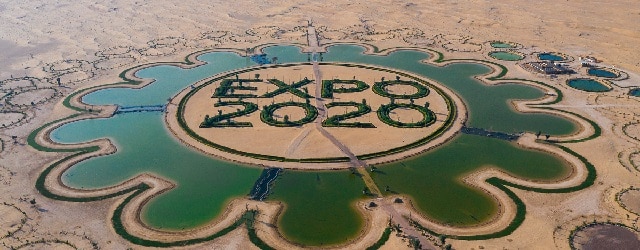Dubai and the UAE hope the Middle East’s first world expo will provide a much-needed jolt to the local economy.

The first such event hosted in the Middle East, Expo 2020 Dubai is expected to boost the local economy and fill hotel rooms when it opens in October for a six-month run. The staging of the world expo is expected to generate more than 275,000 new jobs and inject nearly $23 billion into the economy of the United Arab Emirates, according to KAM Auditing.
The world expo, which could attract more than 25 million visitors according to official estimates, will occupy 1,082 acres near Al Maktoum International Airport in Dubai South and include a pavilion for the 192 participating countries. Coinciding loosely with the UAE’s 50th anniversary in 2021, it “should provide a lift to the economy when it rolls into town later this year,” wrote William Jackson, chief emerging markets economist at Capital Economics, in a February blog post. “But the boost will be temporary, and potential overcapacity in the real estate and tourism sectors after the event is likely to weigh on the revenues of government-related entities, which were the center of the 2009 debt crisis.”
Dubai and the UAE are determined to impress. HOK, a St. Louis, Missouri-based design, architecture and engineering firm, designed the master plan organized around a central plaza, Al Wasl, or “the Connection” in Arabic. The theme of Expo 2020 Dubai is “Connecting Minds, Creating the Future.” Historically, Al Wasl was a name recorded by the British in the early 19th century in reference to Dubai’s role in connecting people from across the region.
Three thematic districts dedicated to the subthemes of the expo—opportunity, mobility and sustainability—will surround the central plaza. The UAE pavilion, inspired by the look of a falcon in flight, was designed by Spanish architect Santiago Calatrava, who also designed the World Trade Center Transportation Hub in New York City. The site will have its own dedicated Dubai Metro station.
Even if temporary, the additional revenue is welcome. The local property market remains in the doldrums, with prices down 40% since the 2014 collapse in oil prices. In February, port operator DP World delisted from the Nasdaq Dubai stock exchange, returning to private ownership. The deal was “an effort to secure funds for its parent’s debt repayments,” Jackson writes, adding that it “may be a sign that debt servicing is already becoming a pressing issue.”
“Dubai’s hosting of Expo 2020,” says the Wealth Report 2020, released in March by consultants Knight Frank, “along with an overhaul of investment visas—as well as greater powers for Dubai’s Real Estate and Regulatory Agency, which empowers it to oversee the strategy for all future real estate projects—are together adding some optimism to the market. The annual rate of decline slowed to -0.7% in 2019.” The expectation is that overbuilding will not be allowed to continue.
“Sustaining robust non-oil growth after Expo 2020 remains a key priority, made all the more pressing over the longer term by the likelihood that global oil demand will slow,” says Koshy Mathai, head of an International Monetary Fund team reporting last November following their visit to the UAE. “The team discussed two policy priorities with the authorities: (i) promoting growth of the non-oil private sector, including small and medium enterprises; and (ii) strengthening fiscal frameworks to ensure both sufficient saving of oil wealth for future generations and smoothing of short-term fluctuations.”
“In the first area, the authorities have already taken a number of important steps, including adopting a foreign direct investment law allowing 100% foreign ownership in selected sectors, and reducing or eliminating fees and penalties,” Mathai says. “The IMF mission recommends that fiscal frameworks be complemented with better monitoring and analysis” of contingent liabilities of government-related entities. It also advises “supportive institutions like independent and technocratic fiscal councils be established to provide impartial advice on economic conditions and ensure proper implementation of the frameworks.”
With oil prices falling further in response to coronavirus fears, the UAE economy will continue to struggle. Markit’s whole-economy purchasing managers’ index for the UAE fell to 49.3 in January from 50.2 in December, slowing private-sector credit growth. “The tourism sector has been a relative bright spot. Dubai attracted a record 16.7 million tourists in 2019. But, as a signal of the overcapacity in the sector, the [hotel] occupancy rate fell further,” Jackson observes.



